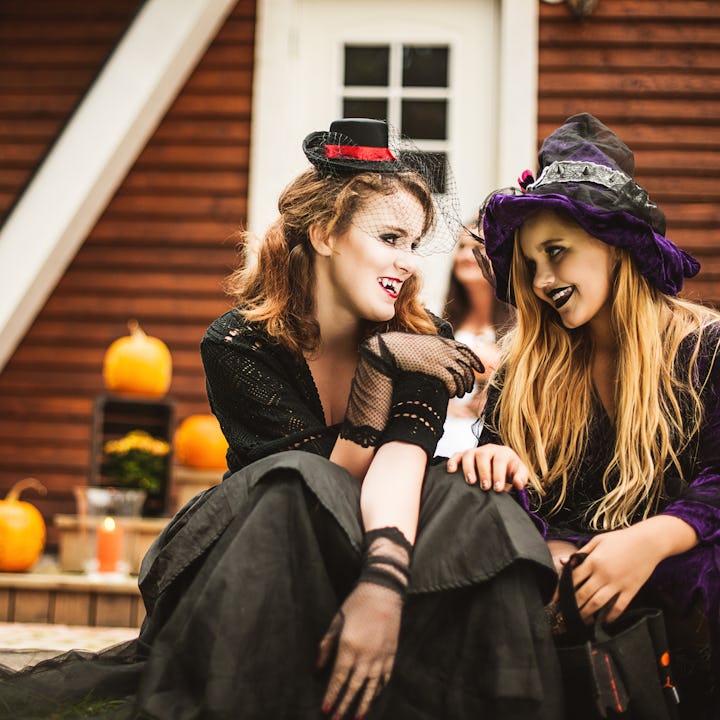My Tween Picked A “Sexy” Halloween Costume — What Should I Do?
A therapist helps navigate this tricky situation.

As the eternally wise Cady Heron once said, "Halloween is the one night a year when girls can dress like a total sl*t and no other girls can say anything about it." And while we're not here for sl*t-shaming in any way, shape, or form, it's also understandable if you have concerns about your tween's Halloween costume, especially if it's a little less "Cady as a zombie ex-wife" and a little more "Regina George in a skimpy bunny outfit."
You might be torn because you want your kid to have fun and express their creativity, but you also want them to stay safe — and warm — on Halloween. So what do you do when your tween comes home with a costume that might be just a bit too "adult" for them? Madeline Lucas, LCSW, Clinical Content Manager and therapist at Real, explains how to navigate these tricky waters, ensuring you empower your tween in their choices without panicking that they’re growing up too fast.
While Halloween costumes might not seem like a big deal, there's a good chance your tween has been thinking about theirs for weeks or months, and you likely don't want to disappoint them. And even if their choice might raise your eyebrows a little, Lucas explains why tweens might opt for something that's a bit boundary-pushing, even if they normally don't display other "adult" behaviors. "Kids are exposed to endless ideas out there of how they 'should' dress for Halloween and are exposed to different characters in the media they want to dress as," she says. "It is understandable that this may lead to costume ideas that are creative — but perhaps more appropriate for an older audience."
The unique developmental stage of a pre-teen could certainly be at play here, says Lucas. "Tweens are at an age of identity development that involves exploration and curiosity. While each individual may have a general understanding/belief/idea of what is 'age appropriate' or not, this decision ultimately comes down to the parent or family involved and their comfort level. It is often less about the subject of the costume and more the expression, and how this does or does not align with the age of the child."
How to Have the Costume Conversation
OK, so what do you actually say when you notice the "sexy witch" costume sitting in your kid’s room? Or when you take them to Spirit Halloween, and they beeline for the Playboy Bunny section? How do you approach your tween in a shame- and judgment-free manner that also hopefully prevents a screaming match and/or emotional meltdown?
"Start a conversation with curiosity," suggests Lucas. "Often this concept of something being age-appropriate in discussing anything sexuality-related with kids can be more of a conversation-ender than a starter." Lucas recommends asking open-ended questions such as: "How did you decide you want to dress as x for Halloween?" or "What drew you towards that costume/excites you about it?"
"There may be a lot to learn about your child and what this costume represents for them," she says. "It may be a part of themselves they're curious about or haven't been able to explore yet."
And much of this includes what you don't say, as well as what you do. "Kids are very intuitive," says Lucas. "They are able to pick up on even subtle cues of what 'should' or 'should not' be discussed or questioned and will adapt/adjust accordingly. In these cases, labeling something as not age-appropriate without a conversation can create a sense of shame or distrust or self-judgment, almost used to gatekeep, instead of a space to explore very normal sexual curiosity for this age group. Creating a conversation also allows parents a space to trust their instincts to know what feels best in navigating conversations around sexuality, identity, and more."
How to Choose an Age-Appropriate Halloween Look Instead
Ultimately, you are the parent, which means you can and should use your judgment if your child's costume choice does veer into "too-adult" territory. "Remember that asking questions and starting the conversation doesn't mean you have to approve of the costume or let them go ahead with it, but it may create space to find an alternative that still meets those needs for curiosity and exploration, a compromise that you both can feel comfortable with," says Lucas.
"Also, if you aren't OK with their costume selection, make sure you're clear about what it is about and what it is not about," she adds. "To me, this is one of the most important things to distinguish." As for what to say here, she suggests something like: "This isn't about my not loving your curiosity and desire to explore and have fun on Halloween; it's about my wanting to support you in a way that feels safe or aligned with where you're at."
If you do decide your child's costume choice isn't the one, Lucas recommends working together to brainstorm ideas that are similar to their original pick but a bit more age-appropriate, which might involve wearing the same look but with less makeup or by adding a jacket, leggings, and/or a bodysuit underneath for more coverage. Lucas suggests asking: "What do they want to represent or tap into? What interests them?" Finding a compromise will likely put you both at ease and ensure there are plenty of tricks and treats — but no tears — this Halloween.
This article was originally published on